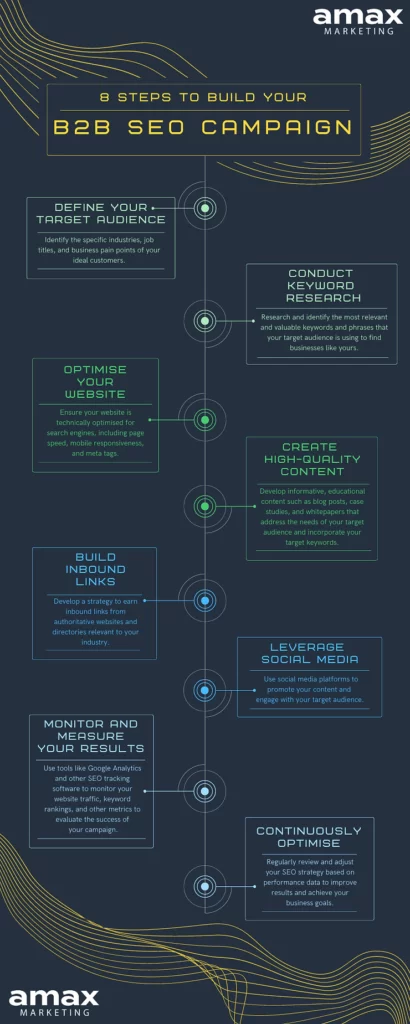What is B2B SEO?
B2B SEO (Business-to-Business Search Engine Optimisation) is a strategy used to improve the visibility and ranking of a B2B website or online presence in search engine results pages (SERPs). It is a set of techniques and tactics used to increase the quantity and quality of organic traffic to a B2B website from search engines such as Google, Bing, and Yahoo.
The goal of B2B SEO is to help B2B businesses attract relevant traffic from potential customers who are actively searching for their products or services online.
B2B SEO often involves optimising website content, metadata, and technical elements such as page load speed and mobile responsiveness to improve search engine visibility and drive more qualified traffic to a B2B website.
B2B SEO strategies may also involve the creation and promotion of high-quality, informative content such as blog posts, whitepapers, case studies, and other resources that address the needs and interests of B2B buyers.
Additionally, B2B SEO may include building links from relevant websites and directories to improve a website’s authority and credibility with search engines.

Source: Investopedia
How Different is B2C SEO?
B2B SEO and B2C SEO have some similarities but also some key differences. One of the main differences is the target audience.
B2B SEO is focused on attracting and converting business customers, while B2C SEO is aimed at individual consumers. This difference in target audience impacts the types of keywords, topics, and content that are relevant and effective for each type of SEO.
Another difference is the buying process.
B2B purchases are typically more complex, involve longer sales cycles, and require more decision-makers than B2C purchases.
Therefore, B2B SEO strategies often include more educational and informative content that addresses the needs of different buyer personas at different stages of the buying cycle.
B2B companies may also use more specific, industry-specific keywords to attract highly qualified leads, while B2C companies may focus on broader, more general keywords that appeal to a wider audience.
Overall, the key differences between B2B SEO and B2C SEO reflect the differences in the target audience, buying process, and content needs of these two types of businesses.

These steps can help you build a strong B2B SEO campaign that attracts and converts qualified leads from search engines.
Pros and Cons of B2B campaign
B2B SEO (Business-to-Business Search Engine Optimisation) has several advantages and disadvantages.
Here are some of the pros and cons of B2B SEO:
Pros:
- Targeted Traffic: B2B SEO is designed to attract businesses to a website, so it brings in more targeted traffic than other forms of SEO. This means that the website will attract more qualified leads that are more likely to convert into customers.
- Long-term benefits: The effects of B2B SEO are long-lasting. Once a website has achieved high rankings, it can continue to attract traffic and generate leads for a long time.
- Cost-effective: B2B SEO is a cost-effective way to generate leads and increase sales. Compared to other marketing strategies, such as PPC advertising or social media marketing, B2B SEO is a more affordable and sustainable solution.
- Brand Awareness: B2B SEO can help to increase brand awareness and establish a company as an industry leader. By ranking high in search results, a business can create a positive brand image and gain credibility with potential customers.
Cons:
- High Competition: B2B SEO is a highly competitive field, as many businesses are vying for the same keywords and search terms. It can be difficult to achieve high rankings and maintain them in a crowded field.
- Slow Results: B2B SEO takes time to produce results, and it can be frustrating for businesses that want to see immediate results. It can take several months or even years to achieve high rankings, depending on the level of competition and the quality of the website’s content and optimisation.
- Technical Expertise: B2B SEO requires technical expertise, including knowledge of website design, coding, and search engine algorithms. This can be challenging for businesses that lack the technical expertise or resources to handle SEO in-house.
- Constant Changes: Search engine algorithms and SEO best practices are constantly evolving, and businesses need to stay up-to-date on the latest trends and changes. This can be time-consuming and require a significant investment of resources.











We have been working with Amax Marketing for the last few weeks and have already been impressed with the results we've seen.
As experts in outreach and digital PR, we knew we'd be in safe hands. We are looking forward to the coming months, and getting some fantastic results!